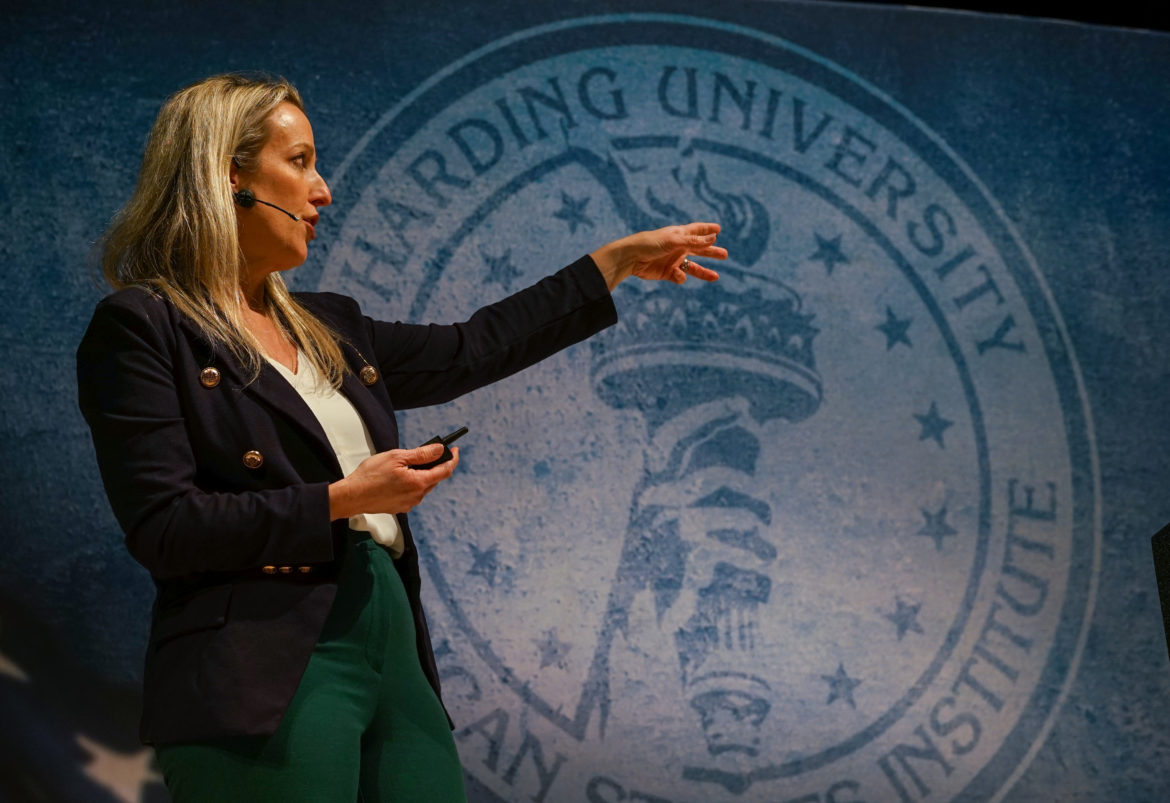Written by Sophie Rossitto // Photo by Macy Cox
The American Studies Institute (ASI) welcomed an economics professor and author to campus March 13 to give a lecture on connections between foundational spiritual principles and economic freedom in society.
Dr. Anne Rathbone Bradley, who teaches economics classes at George Mason University in Washington, D.C., spoke in Benson Auditorium at 7:30 p.m. on the topic of “Biblical Human Flourishing and Economic Freedom.”
According to the ASI website, Bradley serves as vice president of academic affairs at The Fund for American Studies, an educational nonprofit. She has written and co-edited three books on Christian approaches to economics. Bradley has also co-written a book called “The Political Economy of Terrorism,” which is set to come out this year.
Bradley compared her definition of “flourishing” to the Hebrew word “shalom,” which describes qualities such as health, wholeness and strength. Bradley said this concept of well-being is related to God’s plan for humans in Genesis 1:27-28 when he created them in his image and instructed them to “be fruitful and multiply.”
Since God has given dignity to each person, Bradley said human systems need to also extend honor and respect to everyone.
“Any economic, legal, cultural system has to be grounded in universal human dignity,” Bradley said. “It is very easy for us to believe that we have dignity. It is harder for us to extend dignity to everyone else.”
The sinful fall described in Genesis had an impact on the sphere of economics, Bradley said. Things in this broken world will always come at a cost, and humans will always have a scarcity of resources such as time and knowledge.
Bradley said her idea of economic freedom has been influenced by the work of economist Milton Friedman, who described this type of freedom as the ability of people to leave and enter markets without being forced.
Bradley said humans naturally want to act in their own interests, but these desires do not always have to result in greed and manipulation. She said one approach, which is supported by scripture, to cultivate healthy economic relationships is to offer incentives for people to satisfy their own interests while helping others at the same time.
“Biblical prosperity is mutual,” Bradley said.
Junior Gauge Shaw said he is studying to become a clinical psychologist, so he liked the way Bradley focused on the idea that certain motives lead individuals to make choices.
“You can apply that to a lot of situations that drive people to do things, especially make economic decisions that are going to impact millions of other people,” Shaw said.
Senior Megan Drause said she appreciated the opportunity to hear Bradley present a female perspective on topics she has learned about in her classes.
“I thought she had some really interesting points to make about how economy can interact with theology,” Drause said. “I’m a business major, so we talk about that a lot.”
Drause said she also appreciated Bradley’s points about helping those living in poverty. The professor said people need to change the narrative about these issues and recognize the dignity of individuals who have been excluded from broad economic exchanges, instead of seeing them as people who are destined to always be poor.
Bradley said college students who want to address problems such as poverty in their communities need to understand that the process of bringing change can be long, but they can collaborate with others who are working toward the same goals.
“We have to be willing to get in there and really kind of walk with people to try to help them,” Bradley said. “And I think that’s hard, but I think it’s necessary.”
